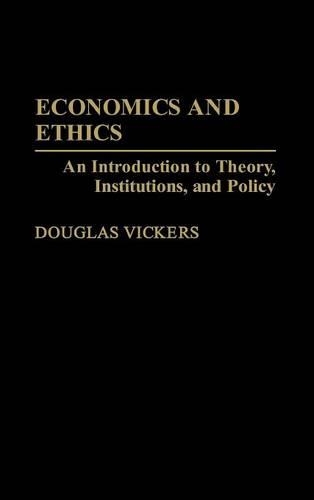
Economics and Ethics: An Introduction to Theory, Institutions, and Policy
(Hardback)
Available Formats
Publishing Details
Economics and Ethics: An Introduction to Theory, Institutions, and Policy
By (Author) Douglas Vickers
Bloomsbury Publishing PLC
Praeger Publishers Inc
30th July 1997
United States
Classifications
Tertiary Education
Non Fiction
Medical ethics and professional conduct
Business ethics and social responsibility
Ethics and moral philosophy
174.26
Physical Properties
Hardback
184
Description
Noted economist Douglas Vickers reexamines the relationship between economics and moral philosophy. That relationship, once very strong, is again the subject of increasing attention and discussion both within and beyond the academy. Vickers reestablishes the substantial bridges between ethical philosophy and economics. He addresses three main issues: first, the historical means by which economics has consciously surrendered its original association with ethical categories and criteria; second, the need to articulate the appropriate thoughtforms and vocabulary of ethical theory; and third, the illustration of areas in economics where ethical awareness is desirable and should be allowed to exert influence. This work is a major analysis which will be of considerable interest to economists, the business community, government regulators, and all concerned with economic decisionmaking in modern society.
Reviews
.,."many can benefit from reading Ethics and Economics...readers prossessing some familiarity with both fields...can result in a more advanced understanding of how ethics and economics are indeed related."-Eastern Economic Journal
...many can benefit from reading Ethics and Economics...readers prossessing some familiarity with both fields...can result in a more advanced understanding of how ethics and economics are indeed related.-Eastern Economic Journal
The trend has never reversed and modern economists take pride in the value-free quality of their work. Vickers, who deplores the isolation of economics from ethics, endeavors to turn back the clock and shatter faith in value-free economics. He explores the background of ethical theory, examines cases where economic thinking would be improved by a connection with ethics, and demonstrates that the policies derived from positive economics are as biased as the policies of normative economics....Economics and Ethics is provocative reading for economists, politicians, moralists, and philosophers.-Business Library Review
Vickers here makes a worthy contribution to a small but growing scholarly conversation about the connections between economics and philosophical ethics. Impressively, he surveys a good deal of historical development concerning the unfortunate split between economics and moral theory....-Theological Studies
..."many can benefit from reading Ethics and Economics...readers prossessing some familiarity with both fields...can result in a more advanced understanding of how ethics and economics are indeed related."-Eastern Economic Journal
"Vickers here makes a worthy contribution to a small but growing scholarly conversation about the connections between economics and philosophical ethics. Impressively, he surveys a good deal of historical development concerning the unfortunate split between economics and moral theory...."-Theological Studies
"The trend has never reversed and modern economists take pride in the value-free quality of their work. Vickers, who deplores the isolation of economics from ethics, endeavors to turn back the clock and shatter faith in value-free economics. He explores the background of ethical theory, examines cases where economic thinking would be improved by a connection with ethics, and demonstrates that the policies derived from positive economics are as biased as the policies of normative economics....Economics and Ethics is provocative reading for economists, politicians, moralists, and philosophers."-Business Library Review
Author Bio
DOUGLAS VICKERS, Professor Emeritus of Economics, University of Massachusetts, Amherst, has held positions with universities in the United States and Australia and has served with the National Bank of Australasia and Vauxhall Motors Ltd. Among his fourteen earlier books are The Tyranny of the Market and Money Capital in the Theory of the Firm.
